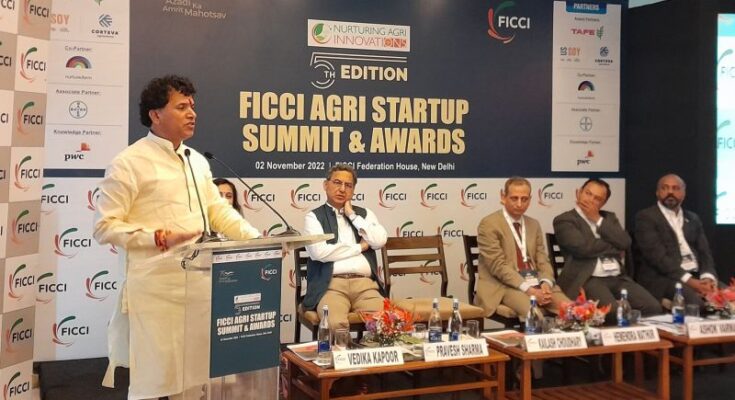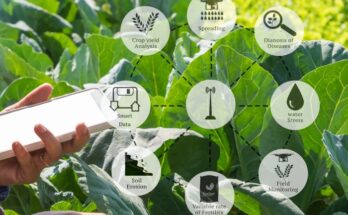Minister of State for Agriculture and Farmers Welfare, Government of India, Kailash Choudhary, today said that there would be a separate division of agri startups to be set-up in the ministry to be led by Joint Secretary. Soon an accelerator programme with Rs 500 crore will be started to take forward the successful initiatives of agri startups in which the Department of Agricultural Research and Education (DARE), Department for Promotion of Industry and Internal Trade (DPIIT), agri incubators, agriculture universities, research institutes, investors and other stakeholders will be included.
Addressing the 5th edition of FICCI Agri Start-up Summit & Awards 2022, Choudhary said, “A cell will also be created to work as a single window agency to facilitate all the linkages required for agri startups,” he added.
Dr. Sudhanshu, Secretary, APEDA, Ministry of Commerce and Industries, GOI, emphasised that increasing agricultural exports is a national imperative and agri startups are potential partners in this journey. Efforts are being made to promote and support agri startups for engagement in agri exports and strengthening of the startup ecosystem
Dr Neelam Patel, Senior Advisor (Agriculture & Allied Sectors), NITI Aayog said that agri startups are taking a pragmatic approach towards innovation that is solving farmer problems at the ground level. She further added that now it’s time to push the throttle towards export orientation and build synergies with FPOs.
You may also like to read: Centre and states’ adoption of drone technology brings good news for Indian agriculture
Hemendra Mathur, Chairman, FICCI Task Force on Agri Start-ups, highlighted that startups can build innovative solutions around traceability, quality assaying and trade facilitation to boost India’s food and agri exports. On the adverse impacts of climate change as well as financing challenges in the agriculture sector, he said, “Agritech, climate-tech and fintech have to merge with each other to handle these challenges.”
Vedika Kapoor, Head GA, South Asia, Corteva, speaking at FICCI’s Agri Startup event said, sustainable innovation, soil health management and providing climate-resilient technologies to farmers are vital. Sustainability is no more an option but a necessity, it has to be a collective responsibility of all.
US Soy embraces sustainable agricultural practices to meet today’s global need for soy products without compromising the ability for future needs to be met said, Jaison John, Team Lead -India at US Soybean Export Council (USSEC).
The agricultural sector contributes 25 per cent to overall GHG emissions. Going ahead, agri startups need to focus on providing affordable and innovative solutions while reducing food wastages, improving agri supply chain efficiency and minimising carbon footprints said, Ashok Varma, Partner, PwC.
TR Kesavan, Chair, FICCI Agriculture Committee and Group President, TAFE at FICCI Agri Start-up Summit & Awards said that cutting-edge technology is changing the agriculture sector in India. The startup ecosystem is creating a legacy which is expected to continue in generation alpha.
You may also like to read: 5 ways science, technology and innovation help transform global agrifood systems
Pankaj K Dwivedi, Head of BD & Agronomy, nurture.farm highlighted that the burden of sustaining food systems needs to be distributed instead of cantered on farmers. All the major stakeholders need to look for simple and implementable solutions.
FICCI-PwC Knowledge report ‘AgTech: A smarter route to sustainable agriculture’ was released during the event.
Key highlights of the Knowledge report
FICCI PwC Knowledge report emphasises that the requirement for food is growing year on year however the land area producing the crops are more or less the same. The world is going to face a challenge in ensuring food availability for approx. 9.73 billion people by 2050 while sustaining the environment at the same time. The solution to this lies in innovative and smart technological solutions for increasing crop production and maintaining ecological balance.
In addition, climate change poses a severe threat to crop yield and thus ensuring food security is going to be a challenge in the future. Agriculture alone contributes to 25 per cent of GHGs emissions and it becomes exigent to adopt and promote agricultural practices that ensure food security while conserving the environment at the same time.
The report recommends a four-pronged ‘UDAI’ approach for achieving sustainable agriculture through agritech startups
- Unique solutions for regenerative practices and natural solutions are imperative.
- Developing a transparency and traceability system is important for future agriculture.
- Adequate training and education for service providers and farmers are vital
- Innovation through R&D and fostering a networking culture need to be promoted.





